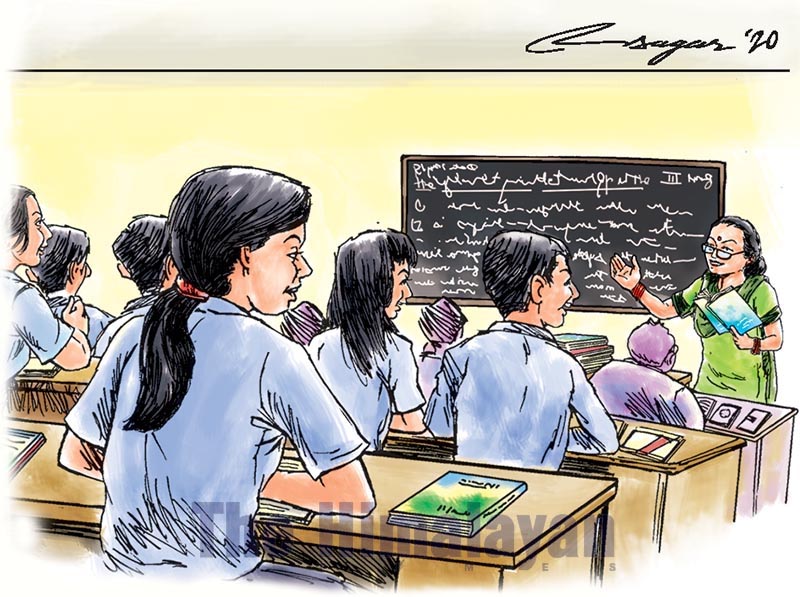Improving public schools: Motivate the teachers
Human beings are emotional beings rather than statistical beings. When their emotions are touched and recognised, they can excel in anything. This is what is lacking in most government school teachers
The quality of education in any government school is questioned basically on the premise that the teachers do not try as hard as the private school teachers. Even poor parents try to send their kids to what people call a ‘boarding’, or private, school so that they can have a good education and hence a good future. However, at the same time, the government invests a lot of money in government schools on teachers’ training, material development and infrastructure. Then why are the results not evident, and why is it that parents prefer private schools to government ones?
When both teachers and commoners are asked why they think education in a government school is not good, they are likely to say that the permanent teachers there are not accountable. In majority of the government schools, we find that there are basically three kinds of teachers- permanent, temporary and private teachers.
Permanent teachers are those who have passed the Teachers’ Service Commission (TSC) exams, which include both a written test and an interview. The exam is considered to be tough with both objective and subjective questions to be solved. Not only that, the candidate has to pass the interview, too, where experience and other knowledge-based questions are asked.
Next come temporary teachers, who are basically hired by the schools when there is a vacancy for the teachers, and permanent teachers are not available. They are the ones who got listed in the substitute teachers’ list in the TSC exams. They too are sent by the government to the schools but don’t get as many facilities and allowances as the permanent teachers. However, they hope to become permanent teachers one day because their experience will be counted as points, and if they have enough of them, they can hope to be listed in the permanent teachers’ category once they sit for the TSC exams.
Last but not the least come private teachers. They are hired by the government schools or community-based schools and are entirely supported by the school. Therefore, they do not get any facility from the government side. It is interesting to note that in most government schools private teachers are said to work harder than the others because they need to impress the principal to keep their job.
Furthermore, it is the permanent teachers who receive a lot of complaints as they take their job lightly. No one can fire a permanent teacher. So it’s a life-time secure job. That’s the reason so many people fight for a government job as there is no provision of firing teachers from the schools. In extreme cases, they can be transferred to less preferable schools, which is rare.
So what can be done?
The government has tried many techniques to motivate the teachers of government schools. It had made it mandatory for the teachers to undergo a ten-month-long training course to gain points for promotion. In addition to that, the government teachers in most schools are required to perform action research and submit the report to the school supervisor, who comes to the school every three to six months to monitor the school and the teachers. For those who don’t know, action research is self-explorative research, where the teachers find the problems of the students or the classroom and try to solve them by planning and taking action. This has, however, not been effective in many government schools as the teachers are found doing it for the sake of formality only. Furthermore, some teachers were even found to be copying other teachers’ action research.
The problem seems to lie not in the government’s efforts but with the attitude of the teachers. When the teachers feel that they will be engaged in that school for the rest of their lives with no one to fire them, they will naturally feel lethargic to work after some years. Being in the same school, teaching in the same classroom and getting some training here and there, but with no real recognition, make them monotonous in their approach.
Human beings are emotional beings rather than statistical beings. When their emotions are touched and recognised, they can excel in anything. This is what is lacking in most government school teachers. They feel stagnant. A teacher might be doing a good job and the whole school might recognise him as a very good teacher, but after a few years, it only seems natural that he feels he doesn’t need to try harder.
What if the government makes a law where the teachers have to switch school every five or seven years? This would solve a lot of problems. On top of that if there is a reward for the best performing teachers, the teachers will be motivated to work even harder, both to establish themselves in a certain school and also to get the reward. Every five or seven years they will have to start anew in a new school with added enthusiasm and motivation.
Of course, this alone will not be enough. The government has to pay attention to the infrastructure, teachers’ training, course development, and evaluation system of both teachers and students. This step will definitely create a buzz among the government school teachers.
They would know that there are no shortcuts in education, and you are responsible for every action you take no matter which political party you belong to or how much experience you have. If this is done, the government schools will thrive.






